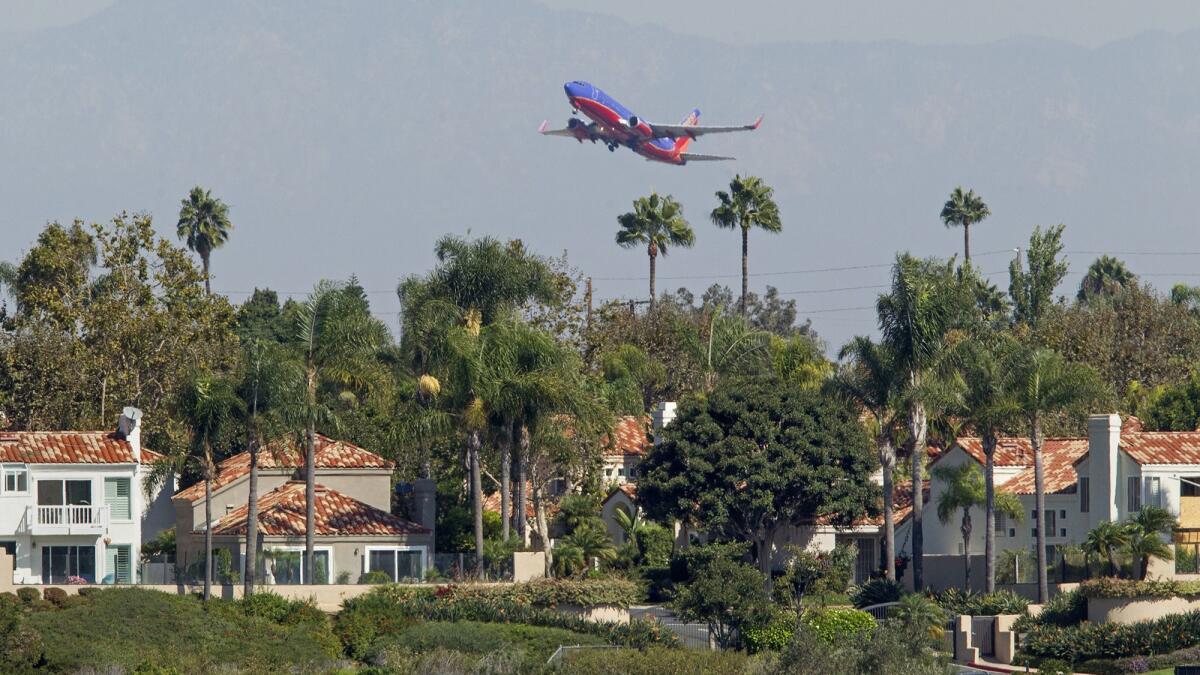Residents in the airport zone need a strong advocate in D.C.

- Share via
Last year, when the Federal Aviation Administration made nationwide changes to its air traffic control procedures, Orange County residents learned that well-intentioned policies can have harmful side-effects.
Designed to make flight routes and airports more safe and efficient, the FAA’s Next Generation Air Transport System, or NextGen, also had some unintended consequences. Practically, NextGen has resulted in a lower, more-concentrated flight path, with an increased number of planes flying above certain Orange County communities, such as Newport Beach.
Despite FAA reassurances that NextGen wouldn’t impact noise levels experienced by Orange County communities, concerned citizens claim the new flight paths have actually exacerbated airplane noise. Further, some groups have also raised concerns about environmental impacts, including the impact an increased concentration of jet fuel could have on residents’ health.
As an Orange County resident, I had been aware for some time of the issue of airport noise in our communities. However, it wasn’t until last month when I met with leaders of three local advocacy groups, AirFair/Still Protecting Our Newport (SPON), Citizens Addressing Airport Noise and Pollution (CAANP) and the Airport Working Group (AWG) that I learned of the full history of our community’s engagement with John Wayne Airport.
Since 1985, residents’ relationship with JWA has been one of the most galvanizing and unifying issues in our community. Many residents agree on two things: The airport is an important institution for our community’s transportation needs and economic vitality, but its importance needs to be balanced with guaranteeing the highest quality of living possible for families.
AirFair and AWG were instrumental in negotiating “The Settlement Agreement” in 1985. Negotiated alongside the Newport Beach City Council and the Orange County Board of Supervisors, the pact was a landmark document that set a limit on noise levels, commercial departures, number of annual passengers and airport capital improvements for a 20-year term. Unique in the nation, the agreement is a great example of what can be accomplished when the private and public sectors work alongside active citizens to find solutions that work for everybody.
The implementation of the NextGen system marked the start of a new chapter in our community’s relationship with JWA. Local leaders have already been active on multiple fronts: Huntington Beach, Aliso Viejo, Newport Beach, Laguna Beach are just a few of the local governments that have created task forces, committees and even filed lawsuits to force the FAA to honor its Settlement Agreement commitments to our citizen Organizations like AirFair/SPON, CAANP and AWG.
However, while local leaders continue to fight for residents with respect to the issue of airport noise, we haven’t seen the same level of efficacy from our elected representatives in Congress. Specifically, in April of this year, Rep. Dana Rohrabacher (R-Costa Mesa), proposed five amendments to the FAA’s annual re-authorization bill that he said would have eased aircraft noise in Orange County. Four of these amendments never made it the House floor because they were sloppy and invalid. House members overwhelmingly voted 375-37 against Rohrabacher’s fifth amendment.
Working with grassroots advocacy groups, the House of Representatives’ Transportation and Infrastructure Subcommittee has released a draft proposal for the new FAA Reauthorization Act, which includes some key measures that do take into account concerns with noise and air pollution. For example, the draft calls for addressing community noise concerns with “dispersal headings,” which would fan flights out across the sky as opposed to concentrating flights along one narrow, noisy flight path, and for increased community involvement in future NextGen planning.
This proposal is a great first step, and Orange County now needs a legislator in Congress who will fight to make these proposed changes a reality, and who will give this important issue the continued attention it deserves. It has become abundantly clear that Rohrabacher isn’t that legislator.
In Congress, I will fight for changes like the ones proposed in the latest FAA Reauthorization Act. I will leave no stone unturned and will go as far as to call a hearing to ensure the FAA’s future plans reflect a commitment to communities, not just airlines. Further, I won’t ignore community concerns regarding airport noise up until election season, but I will work with all stakeholders, including the Orange County Board of Supervisors, John Wayne Airport, local municipalities and grassroots organizations, to find common sense solutions that maintain our quality of life in Orange County, and allow the airport to continue to operate as a vital asset to our community.
Democrat Harley Rouda is running for Congress in the 48th District.
All the latest on Orange County from Orange County.
Get our free TimesOC newsletter.
You may occasionally receive promotional content from the Daily Pilot.



